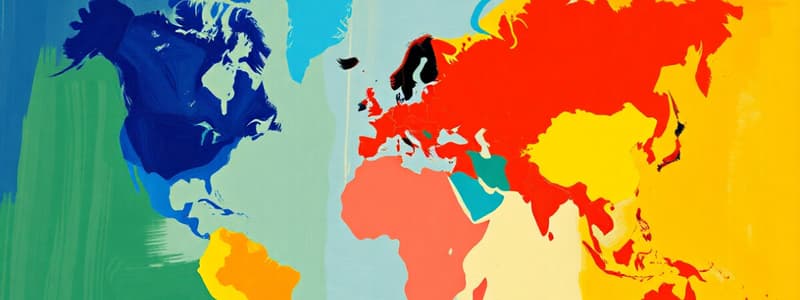Podcast
Questions and Answers
Which factor is NOT considered a domestic determinant of foreign policy?
Which factor is NOT considered a domestic determinant of foreign policy?
- Economic conditions
- Political institutions
- International alliances (correct)
- Public opinion
What does the micro level analysis of foreign policy focus on?
What does the micro level analysis of foreign policy focus on?
- Worldwide economic trends
- The individual decision-maker in leadership roles (correct)
- The collective behavior of nations
- The influence of international organizations
Which analysis level considers the broader systemic factors affecting foreign policy?
Which analysis level considers the broader systemic factors affecting foreign policy?
- Macro level analysis (correct)
- Meso level analysis
- Systemic level analysis
- Micro level analysis
What is the role of values in foreign policy?
What is the role of values in foreign policy?
What term describes the entities capable of making decisions and taking actions in foreign policy?
What term describes the entities capable of making decisions and taking actions in foreign policy?
Which statement best describes foreign policy in the context of meso level analysis?
Which statement best describes foreign policy in the context of meso level analysis?
How can the term 'nation' be defined in the context of foreign policy?
How can the term 'nation' be defined in the context of foreign policy?
What is generally conceived as the basis for achieving objectives in foreign policy?
What is generally conceived as the basis for achieving objectives in foreign policy?
What does 'high politics' primarily concern?
What does 'high politics' primarily concern?
What is hegemony most closely related to in international relations?
What is hegemony most closely related to in international relations?
What does a geopolitical shift signify?
What does a geopolitical shift signify?
What defines state actors in the international system?
What defines state actors in the international system?
What principle does the Westphalian system uphold?
What principle does the Westphalian system uphold?
What does voluntarism imply about decision-making?
What does voluntarism imply about decision-making?
What does the term 'anarchy' refer to in the context of the global system?
What does the term 'anarchy' refer to in the context of the global system?
What does determinism suggest about human choices?
What does determinism suggest about human choices?
What aspect does 'rationalism' focus on in decision-making?
What aspect does 'rationalism' focus on in decision-making?
What are some factors that influence decisions beyond objective data?
What are some factors that influence decisions beyond objective data?
Which of the following best describes low politics?
Which of the following best describes low politics?
Which of the following best describes 'material/hard power'?
Which of the following best describes 'material/hard power'?
What is a critical aspect of pluralism in decision-making?
What is a critical aspect of pluralism in decision-making?
What does the billiard ball view represent in international relations?
What does the billiard ball view represent in international relations?
What does sovereignty primarily refer to in the international context?
What does sovereignty primarily refer to in the international context?
What is one of the key characteristics of 'ideational/soft power'?
What is one of the key characteristics of 'ideational/soft power'?
Which factor primarily influences a state's national interest?
Which factor primarily influences a state's national interest?
What do societal sources of foreign policy refer to?
What do societal sources of foreign policy refer to?
Which approach critiques the gendered nature of the international political system?
Which approach critiques the gendered nature of the international political system?
What does the term 'Black Box' of foreign policy suggest?
What does the term 'Black Box' of foreign policy suggest?
What does the Bureaucratic Politics Approach emphasize in decision-making?
What does the Bureaucratic Politics Approach emphasize in decision-making?
What characterizes a zero-sum game in international relations?
What characterizes a zero-sum game in international relations?
What does expanding understanding beyond states in foreign policy imply?
What does expanding understanding beyond states in foreign policy imply?
How do public opinion and cultural values affect foreign policy?
How do public opinion and cultural values affect foreign policy?
What does rational actor theory primarily focus on in foreign policy?
What does rational actor theory primarily focus on in foreign policy?
What does the term 'homo economicus' refer to in the context of economics?
What does the term 'homo economicus' refer to in the context of economics?
In the actor-structure theory debate, what is at the core of the discussion?
In the actor-structure theory debate, what is at the core of the discussion?
What do structural factors refer to in the context of the structure-agency debate?
What do structural factors refer to in the context of the structure-agency debate?
What assumption about resources does the content suggest?
What assumption about resources does the content suggest?
Which of the following best characterizes the approach of foreign policy analysis (FPA) as mentioned?
Which of the following best characterizes the approach of foreign policy analysis (FPA) as mentioned?
What is a fundamental concept of the 'homo economicus' model?
What is a fundamental concept of the 'homo economicus' model?
What does the assumption of an 'anarchical system' imply in international relations?
What does the assumption of an 'anarchical system' imply in international relations?
Flashcards are hidden until you start studying
Study Notes
Domestic Factors in Foreign Policy
- Public opinion, economic conditions, political institutions, interest groups, political parties, and leadership preferences all influence foreign policy decision-making processes.
Levels of Analysis in Foreign Policy
- Micro Level: Focuses on individual decision-makers like leaders, viewing their choices as the primary driver of foreign policy.
- Meso Level: Examines the domestic context and factors influencing foreign policy. Domestic environment plays a crucial role.
- Macro Level: Analyzes the position of states within international systems, emphasizing how systemic forces shape foreign policy.
Key Concepts in Foreign Policy Analysis
- Policy: Refers to the specific actions and procedures adopted by an actor to achieve objectives based on a strategic plan.
- Values: Represent principles or beliefs of significance for an actor, guiding their actions and decisions.
- Agents/Actors: Entities that make choices and act within a context – individuals or groups.
- Nation: A group with a shared identity, history, and culture, often influencing domestic and international affairs, seeking autonomy or power within a state.
- State Actors: Recognized, sovereign governments representing nation-states in the international system.
- National Interest: Actions taken to benefit a state's objectives, shaped by its political culture, history, and demographics.
- Anarchy: Indicates the absence of a global authority or rule-maker in the international system, with no overarching moral framework.
- Rationalism: Decision-making based on maximizing utility and gains while minimizing losses.
- Sovereignty: A foundational legal concept in the international system, representing a state's capacity to exercise independent decisions.
- Bureaucratic Politics Approach: Highlights how societal structures and bureaucratic demands (ministries, etc.) influence policy decisions.
- Material/Hard Power: Power based on tangible resources (military, economy, etc.).
- Ideational/Soft Power: Power built on persuasion, influence, and intangible factors like symbols or ideas.
- High Politics: Issues of high-level concern to states, potentially leading to conflict, typically involving critical areas like military or economic matters.
- Low Politics: Routine, non-contentious exchanges with controlled limits, rarely reaching the public realm.
- Hegemony: Dominance or leadership of one state or entity over others, shaping international norms and rules.
- Geopolitical Shift: Significant changes in the global balance of power, influence, and strategic alignments, impacting the dynamics of international relations.
- Westphalian System: Emphasizes state sovereignty and non-interference in domestic affairs.
- Voluntarism: Belief that free will drives decisions.
- Determinism: Argue that decisions are influenced by historical forces, prior experiences, and psychological biases.
- Societal Sources of FP: Impact of domestic social factors like public opinion, interest groups, and cultural values on foreign policy.
- Marxist Approaches: Analyze international relations through the lens of class, economic exploitation, and neocolonialism.
- Feminist Approaches: Critique the gendered nature of the international system.
- Centrally Political Aspects: Actions, statements, and values used by an actor to achieve their goals in the world.
- "Black Box" of Foreign Policy: The idea that foreign policy is not solely determined by macro-level factors, but also influenced by micro-level dynamics.
- Billiard Ball View: The metaphor for the international system as a table where states collide with each other, competing for power in a zero-sum game.
- Zero-Sum Game: A situation where one party's gain necessarily results in another party's loss.
- Rational Actor Theory: Assumes that states make decisions based on maximizing gains and minimizing costs.
- Homo Economicus: The concept of a perfectly rational actor who always acts in their self-interest to maximize gain.
- Structure-Agency Debate: Discusses the relative influence of structural factors (like international systems) and human agency (decision-makers) in shaping foreign policy.
- Actor-Structure Theory: Explores the interconnectedness of agency and structure, acknowledging that they influence and shape each other.
Studying That Suits You
Use AI to generate personalized quizzes and flashcards to suit your learning preferences.




